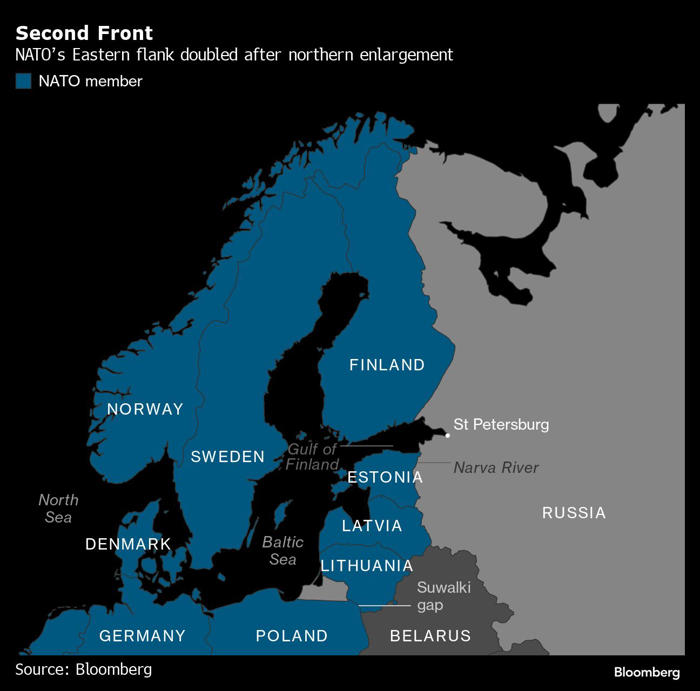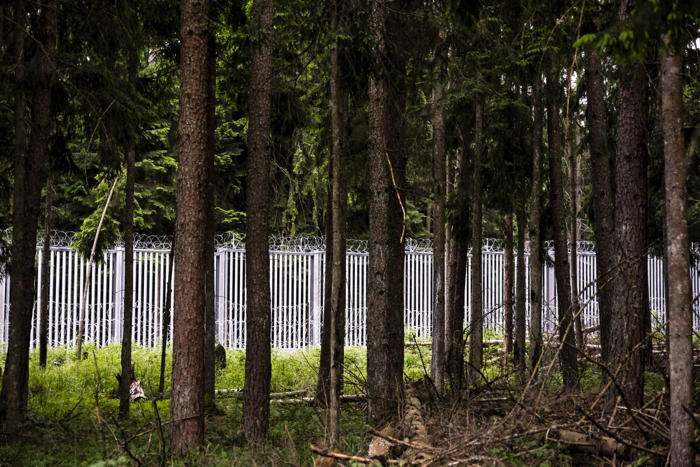Putin’s Hybrid War Opens a Second Front on NATO’s Eastern Border
(Bloomberg) -- Shortly after midnight, several masked men in boats began removing orange navigational aids on the Narva River that separates Estonia from Russia — a watercourse which demarcates the extent of NATO’s reach.
Even that late in the day it’s twilight in northern Europe at the end of May, leaving the Russian border guards who were working to lift the markers clearly visible to the watching Estonian authorities.
Then again, Russia’s actions in the early hours of May 23 weren’t necessarily meant to be conducted under cover of darkness; Estonia took it as an explicit signal of intent to the Baltic states and the West more broadly.
The incident was catalogued as one in a series of acts intended to provoke and destabilize the nations that share a 3,550-kilometer (2,210-mile) frontier with Russia and its ally Belarus. Generally falling short of conventional attacks that could trigger NATO’s collective response, these episodes have grown in frequency since Russia launched its full-scale war on Ukraine in early 2022.
That reality is increasingly turning the Baltic region into a second front in the West’s conflict with Moscow.
“Russia is currently waging two wars,” Finland’s President Alexander Stubb said at a foreign policy forum in Helsinki on June 14. “One is a kinetic, conventional war in Ukraine. The other is a hybrid war in Europe and the West with the aim of influencing the tone of public discourse or in some way shake our sense of security.”

Second Front | NATO’s Eastern flank doubled after northern enlargement
Sending groups of migrants to storm borders; jamming GPS signals; recruiting criminals for petty acts of sabotage: they are part of an expanding repertoire of acts cited by countries from Finland through the Baltic states to Poland and beyond as calibrated to unsettle their citizens.
Each nation shares a troubled history of dealings with Moscow, and all are now members of the North Atlantic Treaty Organization. They’ve responded with plans to reinforce and upgrade the eastern border through a combined $3.5 billion, and have asked for hybrid attacks to be on the agenda at next month’s NATO summit in Washington.
The Russian Ministry of Foreign Affairs in Moscow didn’t respond to an emailed request for comment on its activities on Wednesday.
In the past few months alone, Finland and Sweden have suffered airspace violations, multiple commercial aircraft have been prevented from landing at small airports due to interference with the global positioning system, and Poland has detained people for alleged Russia-backed acts of sabotage inside the European Union.
Questioning established borders is another well-worn tactic given a modern twist.
The Russian frontier at Narva has long been a flashpoint for tensions with Estonia, strains that have ratcheted up since President Vladimir Putin’s invasion of Ukraine. This year, Moscow restricted traffic crossing the border bridge to pedestrians only. Estonia is surveilling the area for drone activity and has put up signs warning travelers of Russian intelligence recruitment efforts.
According to the government in Tallinn, it’s traditionally agreed with Moscow on the location of navigational markers on the river to ensure fishing and leisure boats don’t veer into Russian territory by accident, but that since 2023 Russia has not given its assent and disagreed with the location of about half the 250 buoys planned this year. Estonia demanded the markers that were removed be returned, and said it would continue installing more unless Russia provided evidence that the location of the shipping lane had changed. It’s still awaiting a response.
Read how Russian threats put security at the heart of the EU elections
Finland, Estonia, Latvia, Lithuania and Poland have a combined frontier with Russia that extends over more than 2,300 kilometers; add the 1,250 kilometers shared with Belarus, and that’s longer than the US-Mexico border.
Since the Cold War, a 100 kilometer corridor separating Poland and Lithuania known as the Suwalki Gap has been considered a strategic choke point in any conflict scenario. Sandwiched between Belarus and the heavily armed Russian exclave of Kaliningrad, it’s a territory that, if severed, would cut off the Baltic states’ land access to the rest of Europe.
It’s a vulnerability that’s been used to rattle nerves in Lithuania. In March, Belarusian President Alexander Lukashenko revealed a blueprint to grab the Suwalki Gap and close it to Kaliningrad on the Baltic. Posing in military uniform with a fluffy white dog on his lap, Lukashenko was shown on social media conversing with his army commanders about plans for a land grab of Lithuania and part of northern Poland.
For Lithuanian Foreign Minister Gabrielius Landsbergis, rather than evidence of imminent military activity, it shows that Russia is “attempting to spread fear, uncertainty and doubt about their intentions in the Baltic Sea.”
The states in Russia’s immediate western neighborhood — formerly unwilling Soviet republics, members of the Soviet bloc, or wary observers — have long been among the most hawkish when assessing Moscow’s intentions. Feeling vindicated, they have responded to the war in Ukraine by raising defense budgets well above NATO’s 2% of economic output goal and taking steps toward conscription.
Russia has denounced as provocations the decisions of Sweden, with which it shares a maritime border, and of Finland to break with decades of non-alignment and become NATO members. The Baltic states are each hosting advanced NATO battle groups in a significant increase in the military alliance’s forward presence next to Russia’s border.
“There will be no war today.”
All concerned are having to grapple with disinformation and influence operations at record levels.
Moscow routinely portrays the Baltic states as warmongers and Russophobes, and has enlisted trolls and bot armies to spam social media with malicious content, according to their intelligence services. Where language mistakes in disinformation texts used to make them relatively easy to spot, the widespread advent of artificial intelligence makes the challenge more difficult, Lithuania’s top cyber security agency has warned.
The Kremlin has sought to mobilize Russian-speaking minorities in Estonia and Latvia to sow internal divisions, mostly without success, while in Poland the focus has been on stoking tensions between locals and the large numbers of Ukrainians who sought refuge from the war.
Lithuania’s armed forces stepped in with a message on social media to calm the population in March — “there will be no war today” — after soldiers were approached in public and asked when the conflict was going to start and how to prepare for it.
It’s part of a broader pattern of actions meant to sow fear and anxiety, said Estonian Prime Minister Kaja Kallas, who was placed on a wanted list by the Kremlin this year. “Let’s not fall into the trap of Russian intimidation,” she told reporters on May 23.
Russia has gone low tech, too, sending migrants to frontier zones to put pressure on border control and potentially stir public dissent. It’s a strategy that began in 2015, when scores of people suddenly appeared at remote Lapland border stations in Finland and Norway in what Finnish authorities later determined was a test to gauge preparedness.
A migration crisis erupted in 2021 on a larger scale in Latvia, Lithuania and Poland, with Syrians and other nationalities flown in from the Middle East to Belarus. Forced back by border guards, some froze to death in the forests. In the fall of last year, migrants reappeared at the Finnish-Russian frontier — groups of men on rickety bicycles, some even riding children’s bikes — prompting Helsinki to close all road crossings. The border remains shut.
Barriers to halt migrant flows are being erected in Finland, Latvia and Poland, while Lithuania has finished a 500-plus-kilometer fence on its border with Belarus. Warsaw alone plans to invest about $2.5 billion in fortifying the border, which would protect the country both against conventional invasion with tanks and cyber warfare.
Russia’s European neighbors from Norway to Poland are considering establishing a “drone wall” to combat Russian surveillance drones, track migration and disrupt smuggling. Latvia and Lithuania are planning investing in “drone armies” this year as part of efforts to boost production of the local defense industry, with the latter now offering courses to the public in operating drones just like learning to drive.
With so much investment, front-line countries complain they shouldn’t have to shoulder the burden alone.

Poland's Belarusian Border as Russia's Threat Puts Security at Forefront of European Elections
“We are doing the work for everyone else,” Estonian Foreign Minister Margus Tsahkna said June 13. “This needs to be a European Union issue.”
Seeking to weaken Europe and destabilize it from within, Russia is dipping into its hybrid operations toolbox more actively than ever, according to a May 30 report by the European Centre of Excellence for Countering Hybrid Threats in Helsinki. While large-scale expulsions of Russian intelligence operatives across the region have hampered its ability to carry out such attacks, officials concede they tend to be one step behind whatever Moscow comes up with.
That makes the hybrid threat from Russia ubiquitous, according to Finland’s Foreign Minister Elina Valtonen.
“There is no front line in this,” she said. “All of Europe is at war now.”
--With assistance from Piotr Skolimowski and Leo Laikola.
More stories like this are available on bloomberg.com
©2024 Bloomberg L.P.
